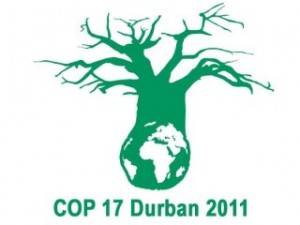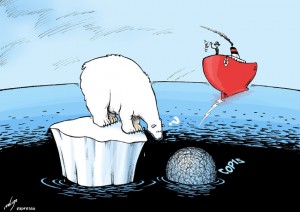Dickinson to Durban » Climate Change » What to expect, with low expectations…
What to expect, with low expectations…
By: Maggie Rees
With COP17 quickly approaching, expectations are running high. The main talk of the town is what might happen with the Kyoto Protocol. A revision of the Protocol, drafted by Australia and Norway involves legally binding agreements, and includes less-developed countries. Resources for the Future describes the changes to Kyoto as follows: 
· Standardizing targets at Durban, including 2020 emissions reduction targets.
· Formalizing and updating targets annually until 2015, ensuring transparency in emissions reductions.
· In 2012, updating targets and establishing rules for international verification.
· In 2013–2014, national reporting of emissions reductions.
· In 2015, a legally binding deal that includes developed country targets and actions by developing countries.
The main concern behind saving the Protocol lies within the main actors in greenhouse gas emissions. Will the United States, China, and India agree? Why should countries reinstate the Kyoto Protocol and strive for further emission reductions when the  main players are not making the same effort? Perhaps the politics are not ready for such commitments. Another argument is whether or not the United Nations is ready for the negotiations. The Cancun agreements were considered by some to have “put the negotiations back on track” (Pearce, 2010). However, it is argued that there have yet to be successes. I guess this leaves us with the question of…will there ever be successes? It is hard to say that success or failure comes with one event. Over the long-term, the fate of climate negotiations does not rely on just one conference. It will take the effort of Copenhagen, Cancun, and Durban to fully grasp the concepts of the negotiations. So, finding the right balance between the urgency of our changing climate and some patience with negotiations will hopefully lead us to success. High hopes in Copenhagen are what many believe led to defeat. Perhaps the world’s level head about Durban’s negotiations will create the opposite – let’s hope so!
main players are not making the same effort? Perhaps the politics are not ready for such commitments. Another argument is whether or not the United Nations is ready for the negotiations. The Cancun agreements were considered by some to have “put the negotiations back on track” (Pearce, 2010). However, it is argued that there have yet to be successes. I guess this leaves us with the question of…will there ever be successes? It is hard to say that success or failure comes with one event. Over the long-term, the fate of climate negotiations does not rely on just one conference. It will take the effort of Copenhagen, Cancun, and Durban to fully grasp the concepts of the negotiations. So, finding the right balance between the urgency of our changing climate and some patience with negotiations will hopefully lead us to success. High hopes in Copenhagen are what many believe led to defeat. Perhaps the world’s level head about Durban’s negotiations will create the opposite – let’s hope so!
Works Cited:
Butkiewicz, Lynann. “Panama Climate Talks Signal What’s Ahead in Durban.” Weblog post. Weathervane: A Climate Policy Blog. Resources for the Future, 13 Oct. 2011. Web. 20 Nov. 2011. <http://www.rff.org/wv/default.aspx>.
Pearce, Fred. “Did Cancun Prove the UN Irrelevant in Tackling Climate?” Weblog post. Yale Environment 360. Yale School of Forestry and Environmental Studies, 16 Dec. 2010. Web. 20 Nov. 2011. <http://e360.yale.edu/mobile/feature.msp?id=2351>.
Filed under: Climate Change · Tags: COP15, COP17, Maggie Rees








Recent Comments